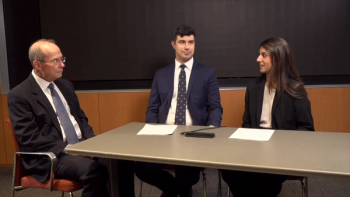
ASRS 2023: Our team asked interviewees which presentations at the annual ASRS meeting they find most interesting
Our team spoke with several researchers and industry professionals at the 2023 American Society of Retina Specialists meeting in Seattle, Washington. We asked them, "What research here do you find exciting or interesting?" Here's what Tarek Hassan, MD, Nancy Lurker, and J. Fernando Arevalo, MD, PhD, FACS, FASRS, had to say.
Our team spoke with several researchers and industry professionals at the 2023 American Society of Retina Specialists meeting in Seattle, Washington. We asked them, "What research here do you find exciting or interesting?" Here's what Tarek Hassan, MD, Nancy Lurker, and J. Fernando Arevalo, MD, PhD, FACS, FASRS, had to say!
Video Transcript
Editor's note - This transcript has been edited for clarity.
Tarek Hassan, MD:
Well, I think, you know, the continued work that's being done in the area of macular degeneration, whether both wet and dry is exciting. And we continue to get more evidence of longer acting drugs, you know, whether it's the higher dose Eylea, or more work being presented on faricimab, showing the great efficacy. And it's great to see the, although there's great controversy that we've seen in some spheres of what's the best way to attack, geographic atrophy and the complement system etc. etc. What we continue to see is, is better and better efficacy as time goes on with these treatments. So I think it's really exciting that we have the ability now to treat dry AMD with things, and we hope that they will continue to just get better and better as new entries into our market come about.
Nancy Lurker:
I think the the other interesting technologies that are on the horizon, are the senescent data from UNITY Biotechnology. I think that's very interesting in terms of what that technology, or really it's a drug, can potentially do in the treatment of these retinal eye diseases. And then obviously, of course, I think we got to keep a close eye on the gene therapies. There's so much happening in that space, and we're starting to see some very nice progress in the use of gene therapies across multiple retinal eye diseases.
J. Fernando Arevalo, MD, PhD, FACS, FASRS:
Well, I have to say that the presentation from the ASRS committee on the Syfovre complications is very important. I think the ASRS and the committee has made a very important contribution by alerting the community and their membership about this potential issue with the new therapy for geographic atrophy. But in reality, it is important to know as well that we don't know what that means here is only 7 cases that have been found to have a significant inflammation, including some of them, significant loss of vision, but we don't know yet the denominator, and it is important to know how frequent this is. We'll keep on working to learn more and to see if this new breakthrough drug can continue saving the vision of our patients with geographic atrophy.
Newsletter
Don’t miss out—get Ophthalmology Times updates on the latest clinical advancements and expert interviews, straight to your inbox.





























